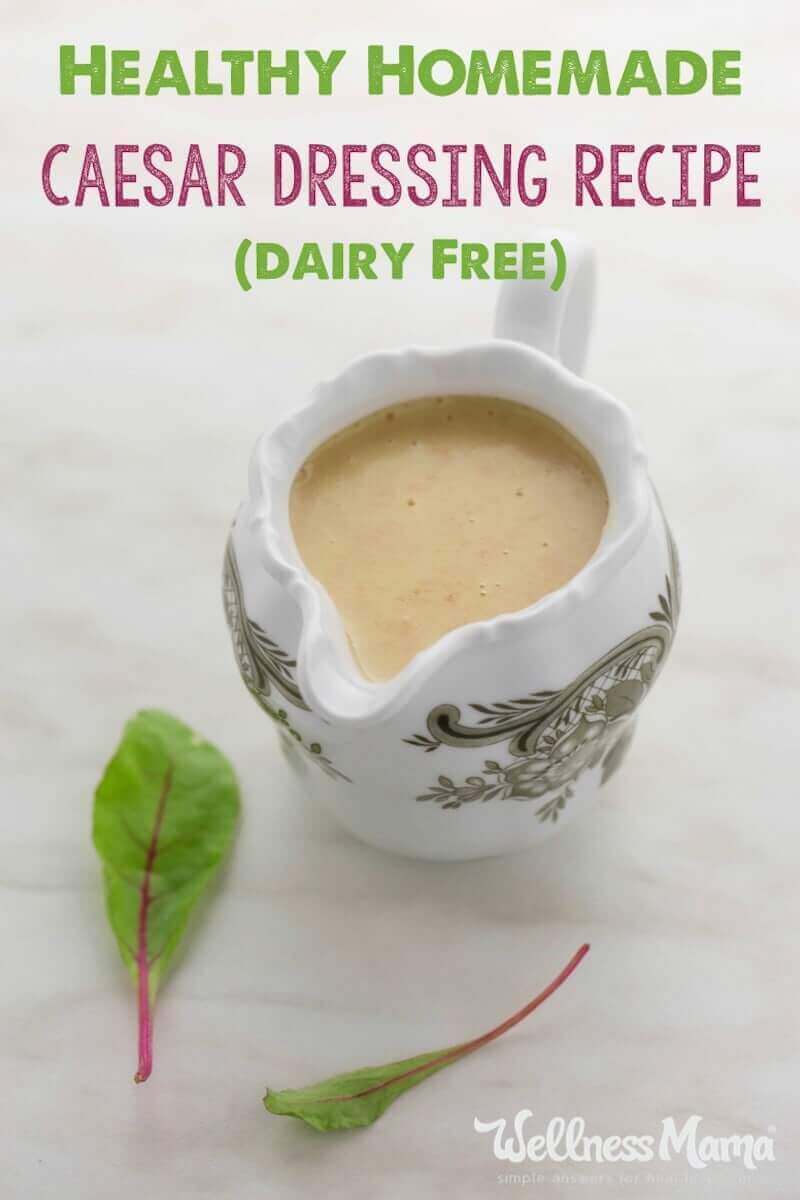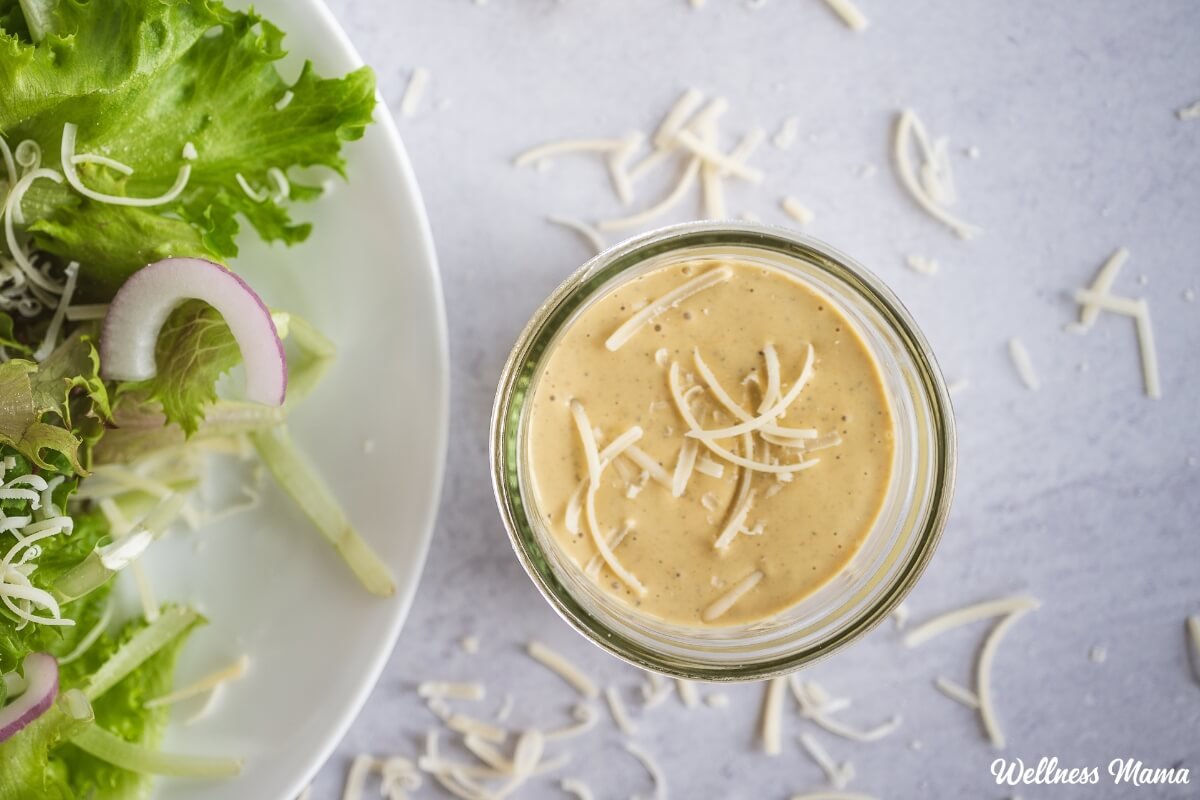I have a history with Caesar salad dressing. Many years ago, before I liked salads (yes, I know!) I thought I didn’t like creamy Caesar dressing. It turns out I just needed to give it a chance! I’ve since come up with this homemade classic Caesar salad dressing and it’s seriously good!
A while ago I was at a meeting at a nice restaurant and the hosts served Caesar salad. I didn’t want to seem rude, so I ate it… and loved it! I’ve been semi-obsessed ever since. The crunchy romaine lettuce, creamy dressing, and parmesan cheese make for some amazing salad.
When I switched to real food I wanted to find a version free of refined vegetable oils and artificial additives, so I experimented with homemade versions. This was definitely one of my tougher salad dressing recipes to figure out and it took a lot of experimentation. I wanted to be able to make it dairy-free, but still really creamy. Caesar salad dressing traditionally gets its cheesy, nutty flavor from Italian Parmesan Reggiano cheese.
Not to boast, but in the end, I came up with a Caesar dressing that rivals any I’ve tried, even in the best gourmet restaurant! This recipe is such a favorite I included it in the Wellness Mama Cookbook.
And the flavor isn’t all it has going for it!
Caesar Dressing Made Healthy
Store-bought Caesar dressing from the grocery store can be fishy, and it’s not from the anchovies. You’ll often find undesirable ingredients like GMO soybean oil, MSG, gluten, and preservatives.
The original Caesar dressing was first created in 1924 and made from scratch tableside. The umami flavor of the anchovies was combined with tart lime juice and Dijon mustard and topped with a cubed crostini. It’s still made this way at the original restaurant in Tijuana.
We’ve come a long way from fresh, tableside ingredients to today’s MSG-laden dressing! Home cooks can reclaim the flavor of the original though with, simple, fresh ingredients. Homemade croutons are optional. It only takes a whisk or small blender and a few extra minutes.
This healthy Caesar dressing is a great way to get more olive oil into your diet, with all of its anti-inflammatory and heart-healthy properties. Pastured eggs, apple cider vinegar, and fresh lemon juice add even more flavor and health benefits.
Dairy-Free Caesar Salad Dressing
For a dairy-free version, simply omit the Parmesan. Some readers have suggested nutritional yeast flakes work well as a substitute and have a “cheesy” flavor. The egg adds a rich, creamy texture, so the dressing still works well without the cheese.
Caesar Salad “Dressed” Up
Just because traditional Caesar salad consists pretty much of lettuce, dressing, and croutons (and usually lots of cheese!) doesn’t mean you can’t be creative and add other healthy veggies.
Try mixing things up and adding some color with olives, peppers, fresh chopped herbs, thinly sliced red cabbage, shredded carrots, or sunflower seeds. Serve with a fresh lemon wedge on the side for extra tanginess.
For a complete meal, top with grilled chicken or shrimp. If you’re like me and want to work Caesar salad into the menu any chance you can, get more meal planning ideas here. This salad dressing also works well to dress up roasted potatoes or on eggs for breakfast. There’s no need to stop with salad!
Homemade Caesar Salad Dressing
A homemade Caesar dressing with real food ingredients like olive oil, garlic, and apple cider vinegar.
-
In a medium bowl whisk room-temperature raw egg yolk with whisk. Or use a blender at low speed.
-
Add apple cider vinegar, mustard, lemon juice, garlic cloves, Worcestershire sauce, anchovy paste, and Parmesan cheese if using, and mix until creamy.
-
Slowly add olive oil, whisking or blending constantly on low speed to emulsify until incorporated.
-
Season to taste.
Nutrition Facts
Homemade Caesar Salad Dressing
Amount Per Serving (2 TBSP)
Calories 182
Calories from Fat 171
% Daily Value*
Fat 19g29%
Saturated Fat 3g19%
Polyunsaturated Fat 2g
Monounsaturated Fat 14g
Cholesterol 49mg16%
Sodium 86mg4%
Potassium 49mg1%
Carbohydrates 2g1%
Fiber 0.1g0%
Sugar 0.5g1%
Protein 1g2%
Vitamin A 70IU1%
Vitamin C 2mg2%
Calcium 16mg2%
Iron 0.5mg3%
* Percent Daily Values are based on a 2000 calorie diet.
If you still want a “cheesy” flavor without the dairy, try adding nutritional yeast flakes instead of the Parmesan cheese.
Tips For Making Caesar Dressing
This recipe is definitely best right after it’s made, but you can store it in an airtight container in the refrigerator for up to one week.
If the dressing doesn’t incorporate well, your egg might have been too cold! If needed, let sit at room temperature for another 10 minutes, and whisk or blend again.
What are your favorite Caesar salad mix-ins? Please share in the comments below!

